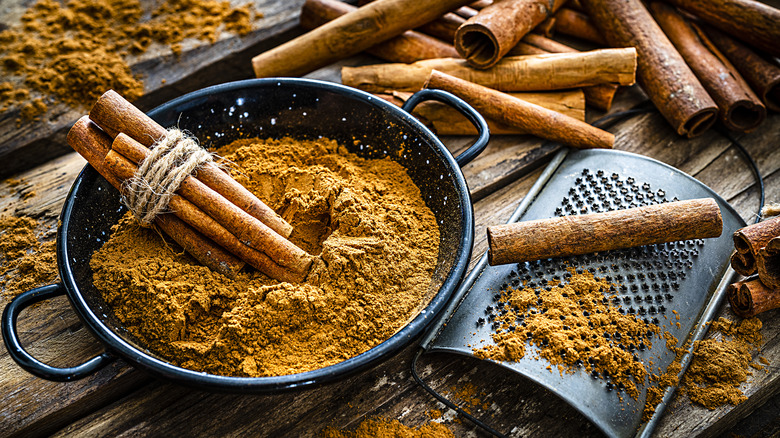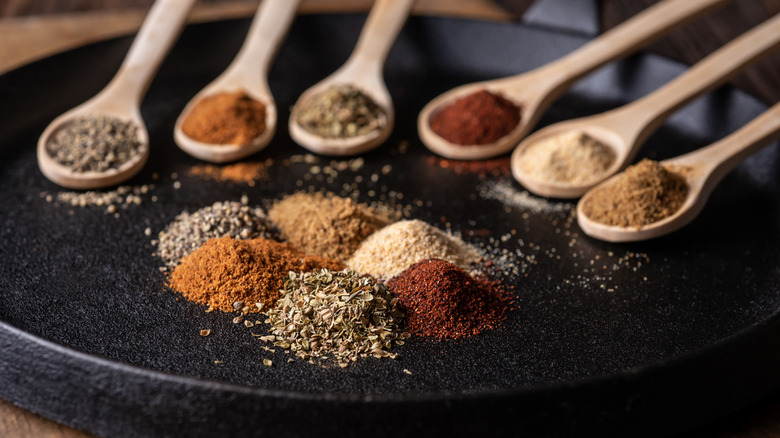Add This Spice To Your Diet To Reduce Your Cholesterol In No Time
Have you had your cholesterol checked recently? Even if you're healthy, you might have high cholesterol and don't know it, says the Centers for Disease Control and Prevention. That's because high cholesterol typically doesn't come with symptoms, which is why you should get your cholesterol checked every four to six years. About 25% of people over age 20 have a total cholesterol level of over 200.
Left untreated, high cholesterol can lead to plaque building up in the walls of your arteries, according to Penn Medicine. Over time, you can develop heart disease or have a stroke.
Although high cholesterol is often treated with statins, changes in your lifestyle such as losing weight, exercising 150 minutes a week, and increasing soluble fiber in your diet can help reduce your cholesterol in as little as six weeks (via WebMD). Adding spices such as cinnamon to your diet might also shave a few points off your total cholesterol.
Cinnamon might reduce cholesterol
According to a 2022 meta-analysis in Complementary Therapies in Clinical Practice, cinnamon could slightly reduce total cholesterol, LDL (the "bad" cholesterol), and triglycerides in people with metabolic syndrome and other disorders. However, the amount of cinnamon used in clinical studies is much more than sprinkling it on your morning latte. Improving HDL (the "good" cholesterol) meant taking in more than 1.5 grams of cinnamon a day.
A 2017 study in Lipids in Health and Disease had Asian Indians with metabolic syndrome take 3 grams of cinnamon capsules every day. After 16 weeks, their HDL increased and their LDL and total cholesterol decreased.
However, other studies found that cinnamon supplements had no effect, especially compared to a low-dose statin. According to a 2023 study in the Journal of the American College of Cardiology, taking 2,400 milligrams of cinnamon every day for 28 days didn't significantly change people's cholesterol levels.
You also want to be careful not to go overboard with cinnamon supplements, according to The Conversation. Cinnamon might cause problems in high doses because it has coumarin, which can exacerbate liver disease. Cassia cinnamon has a lot more coumarin than Ceylon cinnamon.
Other spices that might reduce cholesterol
Research has also looked into the effect of other spices and supplements on reducing cholesterol levels. According to a 2018 article in Clinical & Medical Biochemistry, ginger might work by switching on enzymes that help the body use cholesterol rather than storing it in your body. The study found that taking 5 grams per day of a ginger supplement for three months decreased LDL cholesterol by 17% and total cholesterol by 9%.
Although garlic is often marketed as a cholesterol-lowering spice, the National Institutes of Health says that garlic might have a small effect on cholesterol. The research has been mixed. A 2018 meta-analysis in Medicine (Baltimore) found that garlic can slightly reduce LDL and total cholesterol while increasing HDL. However, the 2023 study in the Journal of the American College of Cardiology found that garlic actually increased LDL cholesterol.
A 2017 article in Nutrition Journal pooled the results of seven studies and found that turmeric might reduce LDL cholesterol and triglycerides. The research shows that turmeric has a more significant effect on people who have metabolic syndrome.



